Pete Kelly's Blues Blu-ray Movie
HomePete Kelly's Blues Blu-ray Movie 
Warner Archive CollectionWarner Bros. | 1955 | 95 min | Not rated | Nov 04, 2014
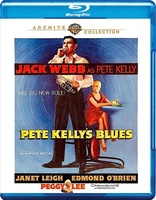
Price
List price:Amazon: $15.15 (Save 24%)
Third party: $15.15 (Save 24%)
Only 8 left in stock (more on the way).
Movie rating
6.6 | / 10 |
Blu-ray rating
| Users | 3.8 | |
| Reviewer | 4.0 | |
| Overall | 3.8 |
Overview
Pete Kelly's Blues (1955)
A Kansas City horn player and his jazz band face extortion from a local gangster. One of the thug's demands: take on his alcoholic girlfriend as a singer.
Starring: Jack Webb, Janet Leigh, Edmond O'Brien, Peggy Lee, Andy DevineDirector: Jack Webb
| Drama | Uncertain |
| Crime | Uncertain |
| Music | Uncertain |
Specifications
Video
Video codec: MPEG-4 AVC
Video resolution: 1080p
Aspect ratio: 2.57:1
Original aspect ratio: 2.55:1
Audio
English: DTS-HD Master Audio 5.1 (48kHz, 24-bit)
Subtitles
English SDH
Discs
50GB Blu-ray Disc
Single disc (1 BD)
Playback
Region A, B (C untested)
Review
Rating summary
| Movie | 3.0 | |
| Video | 4.5 | |
| Audio | 4.0 | |
| Extras | 2.0 | |
| Overall | 4.0 |
Pete Kelly's Blues Blu-ray Movie Review
Just the Music, Ma'm
Reviewed by Michael Reuben November 11, 2014Anyone who grew up watching TV's Dragnet may find it hard to watch Jack Webb or hear his distinctive delivery without immediately thinking of Sgt. Joe Friday, the matter-of-fact L.A. cop who was Webb's tribute to the working stiffs of the police force. But Webb was far more than an actor who played an iconic role. After a successful career in radio, including the first incarnation of Dragnet, he became an entertainment powerhouse with his own production company, Mark VII Limited. As producer, writer and sometimes director, Webb created a body of successful TV work, including the hit shows Adam-12 and Emergency! and the unusual Western, Hec Ramsey, which was often described as "Dragnet meets John Wayne". But Webb's true love was jazz. He spent most of his life trying to master the cornet, and in private hours he could usually be found in clubs and other hangouts where jazz musicians gathered and played. (It was how he met his first wife, Julie London, whom he later cast as a regular on Emergency!) One of Webb's early radio shows, co-created with friend and writer Richard Breen, was called Pete Kelly's Blues and starred Webb as a cornet-playing band leader, whose misadventures provided an excuse for Webb to share his favorite music with his audience. The program wasn't a success, but it gave Webb and Breen the idea for a movie that Breen wrote and Webb produced and directed, as well as playing the title role. Released in 1955, the film of Pete Kelly's Blues wasn't much more successful than the radio program, but it's fascinating to watch today, because it transports Webb's familiar hard-boiled persona back to Prohibition and gives him the "fringe" quality of a film noir hero. The movie also contains rich musical performances from the likes of Peggy Lee and Ella Fitzgerald, as well as an engaging performance by a young Lee Marvin. Like some other intriguing films that defy easy categorization, Pete Kelly's Blues is being released on Blu-ray through the Warner Archive Collection.

The film opens with two scenes that are clearly meant to root Pete Kelly's career in fertile musical soil. The first is the funeral of an unnamed New Orleans horn player in 1915. Unnoticed by the mourners, the man's instrument tumbles from the funeral procession as it departs and lands on the ground. Four years later, the same horn has found its way to Jersey City, where it is offered as a wager in a game of craps being shot in an unused freight train car. The horn is won by Kelly (Webb), newly discharged from the military. Fast forward to Kansas City in 1927 at the height of Prohibition, where the film's main action is set. Kelly and his Big 7 are the house band at the 17 Club, a speakeasy run by Rudy Shulak (Than Wyenn), whose idea of champagne is grain alcohol infused with bubbles. Kelly's clarinettist and best friend is Al Gannaway (Lee Marvin), and his drummer is Joey Firestone (Martin Milner, later the star of Adam-12). Webb narrates the film in the same deadpan tone he used for Dragnet, but the language is more Dashiell Hammet than Joe Friday. ("Rudy's a puny little guy. Sew an extra button on his vest, he'd fall down. But he's all right. The beer's good, the whisky's aged, if you get here late in the day.") As befits a script adapted from a radio serial, the story is episodic, but much of the plot revolves around the efforts of a brutal gangster, Fran McCarg (Edmond O'Brien), to seize control of Kansas City's after-hours entertainment business, starting with the jazz bands. McCarg offers to "manage" Kelly's Big 7 (and every other band in town) for a 25% commission, which translates into "Pay me or else". The "or else" is supplied by an enforcer named Bettonhouser (John Dennis), who is good at his job. When Kelly's band votes to refuse McCarg, the result is an escalating series of violent confrontations that ends in tragedy. A meeting of all the bands is convened at the secret distillery above the establishment owned by Maggie Jackson (Ella Fitzgerald), where Pete advises everyone to accept McCarg's terms, because he's seen this kind of war before, and he knows that musicians never win. Accepting McCarg also means that Pete acquires a new singer, McCarg's girlfriend, Rose, a barely reformed alcoholic whom McCarg expects to stay sober, even though he's now planted her in a gin joint. Peggy Lee sings beautifully as Rose, and she also turns in a convincing performance as a woman who has plenty of sorrows to drown as she sits in the back room at the 17 Club between sets. Eventually she can no longer stand up to sing, and more bad things happen to her. Andy Devine, then best known as Jingles, the comical sidekick on TV's Wild Bill Hickok, plays convincingly against type as George Tennell, a tough federal lawman hunting McCarg, whom Kelly isn't entirely sure he can trust, especially after McCarg's chief enforcer, Bettonhouser, suddenly emerges from the shadows offering to sell out his boss. In the best film noir tradition, everyone's motives are suspect. The film even has a variation of a femme fatale, although her actions arise more from carelessness than venality. Janet Leigh plays Ivy Conrad, a spoiled society girl who parties incessantly and has a thing for musicians, especially a certain cool-headed horn player at the 17 Club. Ivy has an unfortunate habit of showing up unannounced at inopportune times, and although Kelly eventually succumbs to her charms, he knows the relationship has no future. Since Ivy has the voice of Janet Leigh, however, she sings beautifully. And that's the key to Pete Kelly's Blues. For all the machinations of the plot, including a climactic shootout in an elaborate dancehall set complete with what would later be called a "disco ball", the film is about showcasing a certain style of jazz music. Whenever possible, the action stops for a musical performance, either by the Big 7 (many of whom were genuine musicians), or by Ella Fitzgerald singing in Maggie's club ("Hard-Hearted Hannah" and "Ella's Blues"), or by Peggy Lee ("Sugar" and "Somebody Loves Me") or Janet Leigh ("I'm Gonna Meet My Sweetie Now") performing on whatever pretext the script has to offer. Warner Archive doesn't typically provide chapter listings on their Blu-ray releases, but they do offer song lists for musicals, and it's not surprising that one has been provided for Pete Kelly's Blues. Under cover of the cynical narration and the Kansas City crime story, Webb smuggled in a jazz concert.
Pete Kelly's Blues Blu-ray Movie, Video Quality 
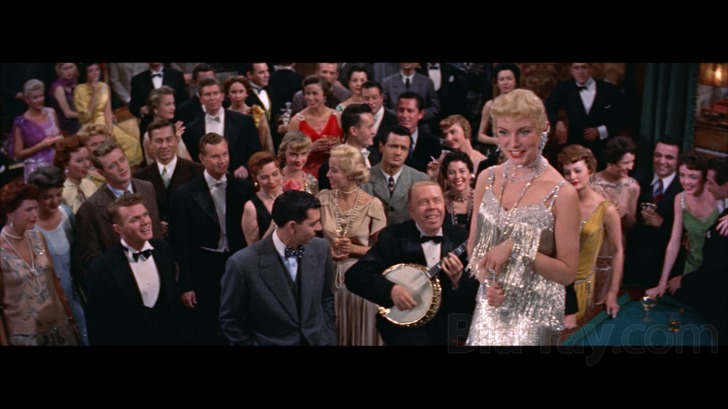
In the trailer included in the extras, Webb introduces his cinematographer, Harold Rosson, as one of the best cameramen in Hollywood, which wasn't overstating it. A five-time Oscar nominee, Rosson's credits include The Wizard of Oz, Singin' in the Rain and Duel in the Sun. For Pete Kelly's Blues, he had the challenge of shooting a period recreation with the early Cinemascope cameras and lenses that required massive amounts of light and were subject to the kind of horizontal stretching that could easily produce what has been called "mumps syndrome". (It can readily be seen in some of the shots of Peggy Lee.) The Warner Archive Collection has done their usual creditable job in bringing Pete Kelly's Blues to Blu-ray. The image on WAC's 1080p, AVC-encoded Blu-ray is smooth and film-like with a fine (very fine) grain pattern and a rich reproduction of the colorful jazz milieu presented in "WarnerColor", which was Warner's rebranding of the Eastman Kodak label. The image sports rich reds, deep blues and solid blacks, and the quality of the color reproduction is repeatedly demonstrated, e.g., during a dance hall sequence where the dancers are bathed in tinted lighting that rotates through the spectrum. Fine detail can be observed in everything from the elaborate flapper outfits worn by Janet Leigh to the individual figures in crowd scenes at bars and parties. Webb and Rosson preferred medium shots to close-ups, even when only one character occupied the frame. They would often fill the frame with people, so that Rosson was challenged to keep everyone in focus. The Blu-ray's clarity and sharpness demonstrate how successfully he accomplished the goal. WAC has followed its usual practice and mastered Pete Kelly's Blues with a high average bitrate, in this case 34.99 Mbps. Given the complexity of the images, the bandwidth is welcome.
Pete Kelly's Blues Blu-ray Movie, Audio Quality 
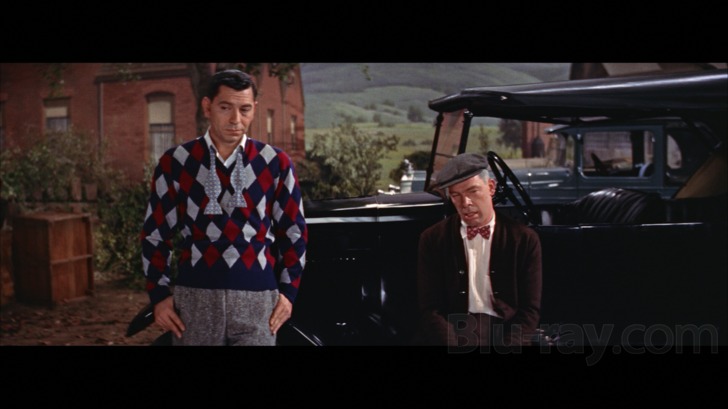
Pete Kelly's Blues was released in both four-track stereo (the magnetic encoding process introduced with Cinemascope) and mono. For the film's 2008 DVD release, the soundtrack was remixed for 5.1, presumably from the stereo stems, which is the version presented on Blu-ray, encoded in lossless DTS-HD MA. Although the mix is largely front-oriented, the wonderful jazz score is the obvious beneficiary of the multi-channel format and lossless encoding. The instruments have detail and a spacious presence that belies the age of the recordings, and the vocal renditions are superior all around. Several shootouts (one quick and one extended) have fairly good impact, although sound designers in the Fifties didn't ramp up gunshot volume the way contemporary effects crews frequently do. The dialogue is always clear. A filmmaker who started in radio, as Webb did, would have insisted on it.
Pete Kelly's Blues Blu-ray Movie, Special Features and Extras 
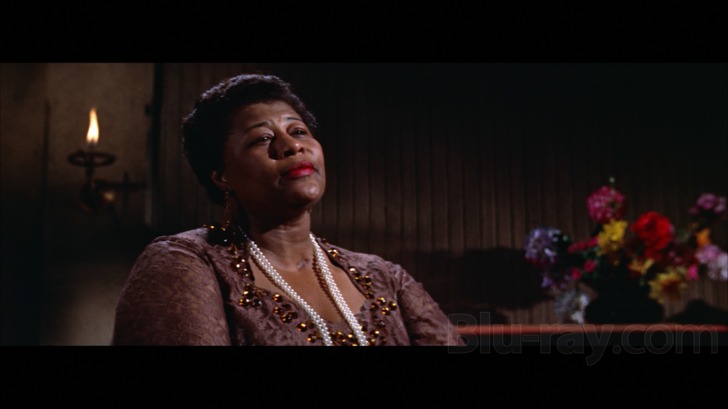
The extras have been ported over from Warner's 2008 DVD of Pete Kelly's Blues (although it isn't clear from the box cover whether the DVD included the trailers).
- Theatrical Trailer Version 1 (1080p; 2.55:1; 3:45): Webb talks directly to the camera about the film and introduces the cast, the cinematographer and a selection of clips.
- Theatrical Trailer Version 2 (1080p; 2.55:1; 5:22): Similar in approach and content to Version 1, but with more detail about the story. In black-and-white.
- Gadgets Galore (1080p; 1.33:1; 10:37): This 1955 short takes an irreverent look at the history of the automobile, using vintage newsreel clips and silent film excerpts, with narration that's strictly tongue-in-cheek.
- The Hole Idea (1080p; 1.33:1; 6:51): A Looney Tune about a professor who invents the world's first portable hole.
Pete Kelly's Blues Blu-ray Movie, Overall Score and Recommendation 
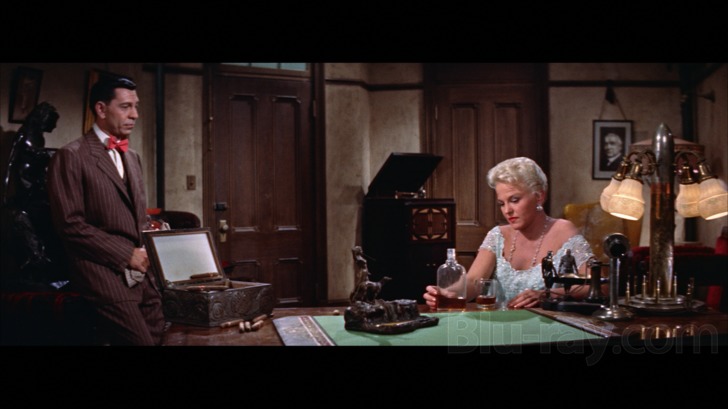
Pete Kelly's Blues isn't likely to show up on anyone's list of "great films", but it's a distinctive experience with a unique flavor not quite like anything else. Breen's script has enough interesting incidents, and Webb's eye for casting was sufficiently sharp, that there's always something worth watching, even when the story seems to be meandering. Even if you don't like jazz, the film holds your attention. If you do like jazz, it's a must-see. WAC has given it a fine treatment. Highly recommended.
Similar titles
Similar titles you might also like

Stage Fright
Warner Archive Collection
1950

House of Bamboo
Limited Edition to 3000 - SOLD OUT
1955

The Country Girl
1954

The List of Adrian Messenger
1963

Key Largo
Warner Archive Collection
1948

Come Back, Little Sheba
1952

The Pay-Off
Losing Game
1930

The Price of Fear
1956

Marked Woman
1937

The Mortal Storm
Warner Archive Collection
1940

Diner
1982

Pinky
1949

Bullets or Ballots
1936

Hell on Frisco Bay
1955

No Orchids for Miss Blandish
1948

Angels with Dirty Faces
Warner Archive Collection
1938

Our Dancing Daughters
Warner Archive Collection
1928

Deception
1946

Devil and the Deep
1932

Three Secrets
1950